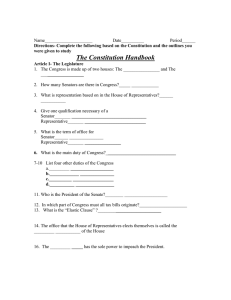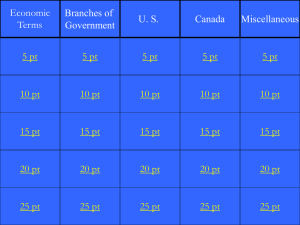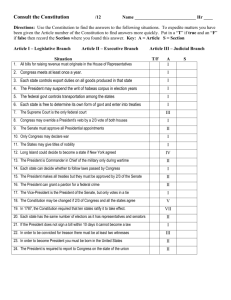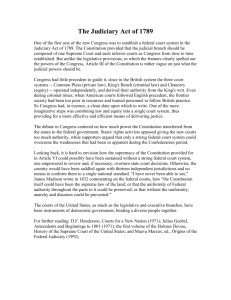Barren County Middle School iLearn@Home 8 grade Social Studies
advertisement
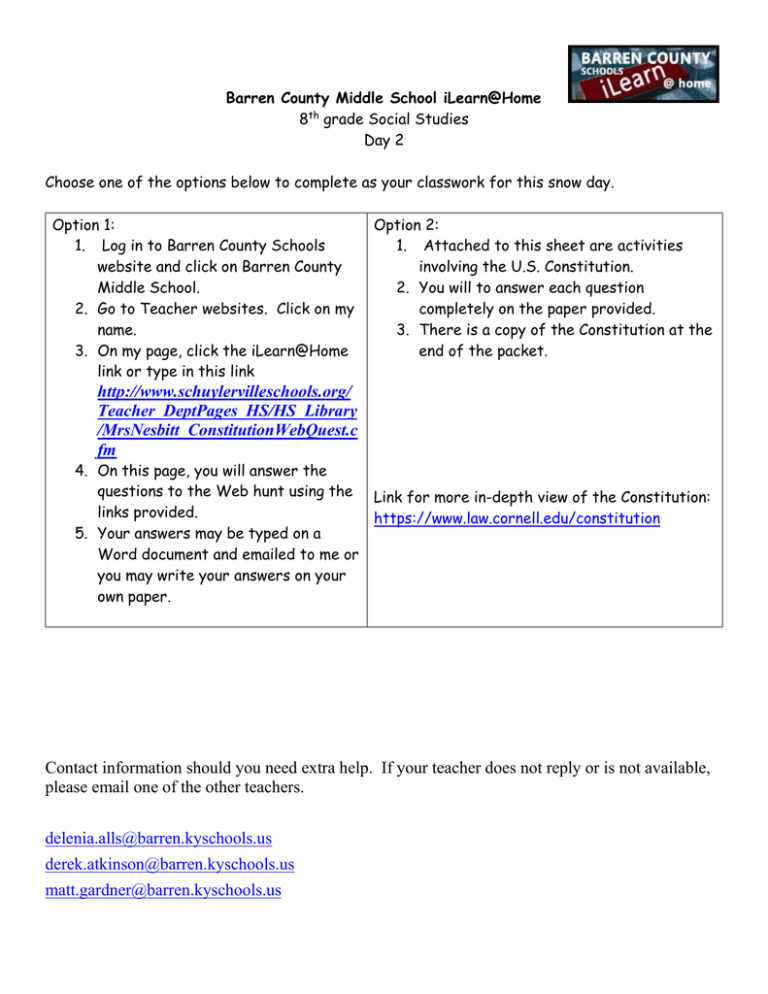
Barren County Middle School iLearn@Home 8th grade Social Studies Day 2 Choose one of the options below to complete as your classwork for this snow day. Option 1: 1. Log in to Barren County Schools website and click on Barren County Middle School. 2. Go to Teacher websites. Click on my name. 3. On my page, click the iLearn@Home link or type in this link Option 2: 1. Attached to this sheet are activities involving the U.S. Constitution. 2. You will to answer each question completely on the paper provided. 3. There is a copy of the Constitution at the end of the packet. http://www.schuylervilleschools.org/ Teacher_DeptPages_HS/HS_Library /MrsNesbitt_ConstitutionWebQuest.c fm 4. On this page, you will answer the questions to the Web hunt using the Link for more in-depth view of the Constitution: links provided. https://www.law.cornell.edu/constitution 5. Your answers may be typed on a Word document and emailed to me or you may write your answers on your own paper. Contact information should you need extra help. If your teacher does not reply or is not available, please email one of the other teachers. delenia.alls@barren.kyschools.us derek.atkinson@barren.kyschools.us matt.gardner@barren.kyschools.us Law Firms Activity Task: Pretend that you are a lawyer working for a law firm. You will be given a series of dilemmas below. You are to write down their legal advice on the dilemma. All advice must contain an answer to the dilemma in complete sentences with the article and section numbers of the Constitution that support the answer. Dilemmas: 1. Your client wants to become president of the United States in 2016. He is now 34, and his birthday is on January 16th. Can he serve? 2. The Senate and the House of Representatives have passed a bill requiring all teenagers, including females, to shave their heads. Who can stop this law from taking effect? 3. A certain congressman is tired of living in Washington, D.C. He wants to move back to his home state and run his ranch full-time. He proposes that Congress not meet at all this year. Is his proposal constitutional? 4. You have a neighbor who was born and raised in Austria. She moved to the United States five years ago. She loves politics and wants to hold an office --- president, senator, member of the House of Representatives ---- she doesn’t care which. Can she? 5. The Senate’s 100 members cannot agree on a law that forces all fast-food restaurants to sell veggie burgers only. They are split right down the middle: 50 are in favor, and 50 are against. Who can break the tie? 6. A blizzard strikes the nation’s capital. Only 200 of the 435 members of the House of Representatives show up for that day’s session. Can they pass bills? 7. A member of Congress is asked by the president to become secretary of defense. Her comment is “Cool. Now I can be both a congresswoman and cabinet member. I’ll have so much power and make a ton of money.” Can she hold both positions simultaneously? 8. The president gets mad at Illinois and decides to declare war on the state. Who can stop him from completing such a strange and unconstitutional act? 9. It has been revealed that the president has been stealing money from the treasury. He now owns Madagascar. That’s right. He purchased Madagascar with stolen money. Under the Constitution, what actions should be taken against him? 10. Your client is having trouble with his mail service. Who is the best person to call: his congresswoman, the president, or the chief justice of the Supreme Court? 11. In a Senate vote, 52 senators vote in favor of a treaty with Belarus, while 48 vote against. Is the treaty approved? ARTICLE I: LEGISLATIVE BRANCH Section 1: 2 houses of Congress Section 2: The House of Representatives 1. Elected every 2 years for a 2 year term 2. Qualifications: a. 25 years old b. Citizen of US for 7 years c. Resident of the state they represent 3. # is based on state population a. # in house is set @435 (1929) b. Reapportionment of seats based on population shifts instead of addition 4. Vacancies Filled through special elections called by the state’s government 5. Officers Speaker of the House is the leader of the majority party in the House and is responsible for choosing the heads of various House committees Section 3: The Senate 1. # is chosen by state legislature a. 17th amendment changed to where directly elected by people. b. 100 members = 2 per state rd 2. 1/3 of Senate is elected every 2 years for a 6 year term (staggered) 3. Qualifications a. 30 years old b. Citizen of US for 9 years c. Resident of the state where elected 4. President of Senate is the Vice President of US whose only duty is to preside over the Senate. a. Only real power is to cast the deciding vote when there is a tie 5. Other officers a. Senate selects President Pro Tempore, the presiding officer who serves when the President of the Senate (Vice President of the USA) is absent or has become President. 6. Trial of Impeachment a. Chief Justice serves as judge. b. Senate serves as jury. c. 2/3rds of member present necessary to convict 7. Penalty a. Remove from office and prevent them from holding another federal position b. Convicted official may still be tried for same offense in regular court. Section 4: Elections and Meetings 1. 1st Tuesday after 1st Monday in November 2. Regular session begins January 3rd. Section 5: Organization and Rules of Procedure 1. quorum a. minimum # of members that must be present for House or Senate to conduct sessions b. House – 218 out of 435 2. Each house sets its own rules and punishes its members for disorderly behavior and expel if necessary. 3. Congressional Record – a complete official record of everything said on the floor 4. Neither house may adjourn for more than 3 days without permission of other house (or move to another location) Section 6: Privileges and Restrictions 1. Congressional salaries are paid by US Treasury. a. It was $6 a day. b. Now it is $136,700. c. Immunity – members can’t be sued or prosecuted for anything that they say in Congress d. Can’t be arrested while Congress is in session except for treason, major crimes, or breaking the peace 2. Congress can’t pass laws that would benefit themselves. Section 7: Passing laws 1. Revenue bills originate in House a. Chief source = taxes 2. How Bills become laws a. Only by passing both houses of Congress and signed by President b. 2/3rdes vote by both houses to override a Presidential vote c. Not signed within 10 days – automatically a law – “pocket veto” 3. Presidential Approval or Veto is a check on Congress Section 8: Powers Granted to Congress ---- “Enumerated Powers” 1. Revenue a. Power to raise and spend revenue 2. Borrow money by issuing bonds 3. Commerce 4. Naturalization and Bankruptcy 5. Currency – control 6. Counterfeiting – illegally imitating or forging 7. Post office 8. 9. 10. 11. 12. 13. 14. 15. 16. 17. 18. Copyright and Patent laws Courts – federal courts (can establish) Piracy – power to protect American ships on the high seas Declare War Army Navy Rules for Armed Forces – regulations to deal with military disciple Militia – organized by states – National Guard Natural Guard – can pass rules for governing its behavior Nation’s Capital – right to make laws for DC Elastic Clause – “necessary and proper” clause a. Must be related to one of the enumerated power Section 9: Powers Denied to the Federal Government 1. Slave trade a. Regulate with Congress exclusive control over interstate commerce 2. Habeas Corpus a. Latin “you may have the body” b. A writ of habeas corpus issued by a judge requires a law official to bring a prisoner c. May be suspended during wartime 3. No Bill of Attainder a. Can’t punish without jury trial b. Expost facto law – makes an act a crime after the act has been committed 4. Direct taxes a. 16th Amendment b. Congress passes an income tax 5. Tax on exports a. Can’t tax goods that move from 1 state to another 6. Uniformity of Treatment a. Can’t favor one state or region over another in regulation of trade 7. Appropriation law a. Protects against misuse of funds b. i.e. President’s expenditures with permission of Congress 8. Titles of Nobility – prohibits Section 10: Powers Denied to States 1. Limitations – States can’t . . . a. Conduct foreign affairs b. Carry on war c. Control foreign/interstate commerce d. Pass laws that the federal gov’t is prohibited from passing 2. Export and Import Taxes (Can’t) 3. Duties, Armed Forces, War --- can’t . . . a. Maintain an army/navy b. Go to war (except in cases where a state is directly attacked) c. Collect fees from foreign vessels d. From making treaties with other nations Article II: The Executive Branch Section 1 1. serves 4 year terms (22nd Amendment limits the number of terms a President can serve to two.) 2. Elected indirectly – electoral college a. # of electors = total # of Senator and Representatives 3. Former method of election --- each elector voted for 2 candidates 4. Presidential elections - 1st Tuesday after the 1st Monday in November; Electors cast their votes on the Monday after the 2nd Wednesday in December 5. Qualifications: a. Citizen of US by birth b. At least 35 years old c. Resident of US for 14 years 6. Vice President becomes President if the President dies, resigns, or is removed from office a. Presidential Succession Act of 1947 7. Salary - $25,000 a. Now, it is $400,000. b. Plus $50,000 taxable expense account, $120,000 non-taxable allowance for travel and entertainment and living accommodations in 2 residences: White House and Camp David 8. Oath of office – administered by the Chief Justice of the US Supreme Court a. Washington was the only president-elect to not be sworn in by the Chief Justice of the US Supreme Court. b. Vice-Presidents – John Tyler, Calvin Coolidge, and Lyndon Johnson – were not sworn in by the Chief Justice. Section 2: 1. Military, Cabinet, Pardons a. “principal officer in each of the executive departments” is the only suggestion of a President Cabinet in Constitution b. Cabinet is an advisory board and power depends on President and approved by Senate c. Military – clause makes President, a civilian, the head of the armed services ----established principle of civilian control of military d. Pardons – for offenses against the US except in cases of impeachment e. Constitution didn’t call for a cabinet. Washington started this practice by relying on a group of trusted assistants. 2. Treaties and Appointments a. President is the chief architect of American policy; responsible for foreign relations b. All treaties require the approval of 2/3rds of Senators present. c. President can remove an appointee without Congressional approval --- can be restricted by conditions set in creating the office. 3. Vacancies a. President can temporarily appoint officials to fill vacancies when Senate is not in session. Section 3: Duties 1. Annual State-of-the-Union address 2. Can call Congress into special session 3. Receive foreign diplomats and power to ask a foreign diplomats and power to ask a foreign country to withdraw its diplomatic officials from this country (implies war) 4. Power to recognize or not recognize foreign governments o Section 4: Impeachment 1. Reasons for --- conviction of treason, bribery, high crimes, and misdemeanors Article III: The Judicial Branch gives judicial powers of gov’t to Supreme Court and other federal courts President appoints these judges who serve for life or “during good behavior” as the Constitution states Courts have power to judge “all cases. . .arising under this Constitution.” --- this allows the Supreme Court to prevent the other branches from violating the Constitution. Under A Flexible Document o Judicial Review – power of Supreme Court to review gov’t acts and possibly declare them unconstitutional o John Marshall – Chief Justice, believed this was what the Founders meant o 1803 – He called an act of Congress unconstitutional in the landmark case known as Marbury vs. Madison – he established precedent or example for future courts to follow 1 of the Nation’s most important institutions – although only briefly described in the Constitution o Function: o To interpret laws of the land and to preserve and protect the rights the Constitution guarantees o o o o Judiciary Act of 1789 o Passed by Congress o Set up the federal court system o Structure of the Court System o Each state has its own separate court system for hearing cases related to state and local law o 3 main levels – only hear cases involving national laws 1. lowest – more than 90 district courts and a # of specialized courts (i.e. Tax Court and Court of Military Appeals) 2. Next – 13 Courts of Appeals and a small # of specialized courts 3. Highest – Supreme Court *** The Appeals Process: o Most federal cases begin at district level where either a judge or jury reaches a decision o If unhappy with decision, appeal to next highest court to review the case o Court of last appeal is the US Supreme Court o The US Supreme Court – 9 justices including the Chief Justice o Decisions are made by a simple majority or a vote of at least 5 Section 1: Federal Courts o Constitution only set up Supreme Court but made provisions for establishment of the other federal courts o “serve during good behavior” – usually serve for life or until they retire Section 2: Jurisdiction 1. General Jurisdiction a. Use of “in law and equity” b. America took over 2 kinds of traditional law from Britain i. Basic law or “common law” ii. “Equity” – a special branch of British law developed to handle cases where common law didn’t apply c. Deal with “statute law” or laws passed by Congress, treaties, and cases involving the Constitution 2. Supreme Court a. Has original jurisdiction – authority to be 1st court to hear a case b. Has appellate jurisdiction – cases that have been appealed from lower courts 3. Jury Trials a. Anyone accused of crime has right to a jury trial except in case of impeachment. b. Must be held in state where crime was committed c. Strengthened by 6th, 7th, 8th, and 9th Amendment Section 3: Treason 1. Definition a. 2 witnesses be present to testify in court that a treasonable act was committed b. Wanted to break away from monarchy style 2. Punishment a. Congress has this power.


